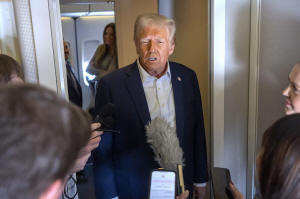In the early going, Trump 2.0 approach on foreign policy is to talk
loudly and carry a big stick
 Send a link to a friend
Send a link to a friend
 [January 28, 2025]
By AAMER MADHANI and ZEKE MILLER [January 28, 2025]
By AAMER MADHANI and ZEKE MILLER
WASHINGTON (AP) — Donald Trump in his first week back in the White House
has offered an early preview to his second-term foreign policy approach:
Talk loudly and wield a big stick.
Over the weekend, Trump threatened to levy massive tariffs on Colombia
after the country’s leftist president refused to allow a U.S. military
plane returning deported migrants from the South American nation to land
in the country.
He’s needled the Ukrainian president for “talking so brave” instead of
negotiating with Russia. He’s flummoxed even Republican allies with his
calls on Mideast nations to take in Palestinian refugees from Gaza,
potentially moving out enough of the population to “just clean out” the
war-torn area to create a virtual clean slate.
Through economic coercion and sharp rhetoric, Trump is signaling that he
intends to be a bull in the China shop in hopes of extracting what he
wants from allies and adversaries alike.
In the Colombia episode, President Gustavo Petro quickly relented in the
face of Trump's threatened tariffs — 25% on all Colombian goods coming
into the country and doubling to 50% in a week. The moment may be just a
taste of what is to come.
“As you saw yesterday, we’ve made it clear to every country that they
will be taking back ... people that we’re sending out,” Trump said in a
Monday speech before House Republicans at their annual policy retreat.
“The criminals and illegal aliens coming from their countries we’re
(sending) them back, and they’re going to take them back fast. And if
they don’t, they’ll pay a very high economic price.”

The hard-nosed approach from Trump in the showdown with Colombia was
hardly unexpected. He vowed to quickly reverse the approach of his
Democratic predecessor, President Joe Biden, whom he frequently
criticized as demonstrating weakness on the international stage when the
world was looking for stronger leadership from the world's foremost
power.
White House counselor Alina Habba said Petro miscalculated and “flexed
with the wrong president.”
“You mess with the bull, you get the horns,” Habba told Newsmax.
Big stick diplomacy
During planning for their return to power, Trump’s team decided on an
aggressive course of action to respond to any nation that moved to block
his agenda, hoping to make an example of them right out of the gate,
according to a senior official who spoke on the condition of anonymity
to discuss internal deliberations.
And with the heavy reliance on sticks rather than carrots in the opening
days of Trump 2.0, the administration has sought to send a clear message
that U.S. foreign policy will be driven by an unrelenting commitment to
the “America First” worldview.
Soon after the Colombia matter was resolved, Trump posted on social
media a photo of himself in a pinstripe suit and Trilby fedora favored
by American gangsters in the 1920s as well as a crass acronym that warns
not to test him. The posting was a decidedly modern, and Trumpian, turn
on President Theodore Roosevelt's use of the West African aphorism to
“speak softly and carry a big stick."
“It seems to me that from the Trump administration’s perspective,
they’ve met their goal, right?” said Kevin Whitaker, who served as the
U.S. ambassador to Colombia from 2014 to 2019. “It’s not just that they
got what they wanted. The approval for the flights was secured. But they
sent a message about their commitment to use all of the tools in their
toolkit in order to achieve them.”
It's not just on immigration where Trump is trying to rattle his
international counterparts to get in line with blunt talk.
The president said that he used a phone call last week with Saudi Arabia
Crown Prince Mohammad bin Salman to press for OPEC+ to slash oil prices,
a move that he believes is the most effective way to force Russia to
negotiate an end to its war against Ukraine. The kingdom is the most
prominent member of OPEC+, a group of major oil exporting nations.
Trump, a critic of the Biden administration's spending to back Ukraine's
war effort, pledged during the campaign to bring a quick end to the
nearly three-year war.
[to top of second column]
|

President Donald Trump speaks to reporters aboard Air Force One as
he travels from Las Vegas to Miami on Saturday, Jan. 25, 2025. (AP
Photo/Mark Schiefelbein)

“One way to stop it quickly is for OPEC to stop making so much
money,” Trump told reporters, in what could be interpreted as a
blunt critique of the Saudis, a key ally. “So, OPEC ought to get on
the ball and drop the price of oil. And that war will stop right
away.”
On Saturday evening, Trump also grabbed the attention of Middle East
partners, Egypt and Jordan, when he said that the two countries
should take hundreds of thousands of Palestinians from war-ravaged
Gaza. Officials from both countries flatly rejected the idea, and
even a prominent Republican Trump backer, Sen. Lindsey Graham of
North Carolina, said he was puzzled by Trump's comments.
“The idea that all the Palestinians are going to leave and go
somewhere else, I don’t see that to be overly practical,” Graham
said in a Sunday morning appearance on CNN’s “State of the Union."
Rubio heads to Central America
The dispute with Colombia's Petro comes as Trump is dispatching
Secretary of State Marco Rubio this week to Central America for his
first international travel as America's top diplomat. The trip will
take him to Panama, El Salvador, Guatemala, Costa Rica and the
Dominican Republic.
The decision to put an early focus on Central America — including
nations that are central to the success of Trump's mass deportation
effort and his bid to clamp down on illegal immigration — speaks to
how big a priority immigration is for Trump out of the gate.
Rubio's stop in Panama also comes as Trump in recent weeks has said
he wants the Panama Canal back under U.S. control, claiming that
“American ships are being severely overcharged and not treated
fairly in any way, shape or form," and that “China is operating the
Panama Canal.”
Some Panamanians have interpreted Trump’s remarks as a way of
applying pressure on Panama for something else he wants: better
control of migration through the Darien Gap. Others have recalled
the 1989 U.S. invasion of Panama with concern.
To be certain, China’s growing commercial interest in the Western
Hemisphere, including its operation of a port at the canal, have
long fueled U.S. concerns about Beijing’s broader role in global
shipping and port operations. The Biden administration shared
similar worries, but sought to counter China by rallying wealthy
economies to band together against China’s trillion-dollar “Belt and
Road Initiative,” which has launched a network of infrastructure
projects and maritime lanes that snake around large portions of the
world.

Colombia ‘firestorm’ a preview of what's to come?
The Biden administration also sought to make the case to developing
nations that the U.S. offered a better partner than Beijing, which
it accused of exploiting poorer nations with “coercive and
unsustainable lending” to build infrastructure.
But Trump in his approach to Panama has taken a wholly different
approach, jostling and threatening an ally to get in line.
Colombia, which was at the center of Sunday's diplomatic
hullabaloo, has a strategic partnership with China, but thus far has
resisted joining the belt and road project as many of its Latin
American and Caribbean neighbors have.
Geoff Ramsey, a senior fellow at the Adrienne Arsht Latin America
Center at the Atlantic Council, said that he expects Petro to
aggressively pursue infrastructure deals with China moving forward.
“I think that’s going to be a source of tensions with Washington,”
Ramsey said. “For better or for worse, Sunday’s firestorm may be
just a preview of what’s to come.”
All contents © copyright 2025 Associated Press. All rights reserved |